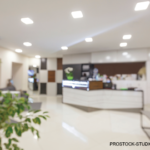
I am sitting in a cozy nook of my new home, preparing for my two stressful and upcoming back-to-back exams: the rheumatology board exam, followed by the MSK U.S. certification exam two weeks later. My armchair vantage point allows uninterrupted views of the carpenter ants’ pathway in the adjacent kitchen, on the wall above the cabinets. With persistent accuracy, they adhere to the same route with occasional random aberration and exploration of various other areas of the kitchen. If you are not familiar with these little creatures’ habits, I learned, during the pest control man’s two visits, that they are not seeking to share our food, but are instead looking for water sources. They are large and annoying, but pose little threat to human health. They may, however, destroy the wood in a house and so must be eradicated.
Finally, separated from the hectic trials and tribulations of fellowship, over the past few weeks I had some time to think. Observation of my ant companions’ repetitive motions provided me with some solemn reflection about nature’s dependable constants in contrast to the recent twists and turns of my life. At times I’ve been angry that my decisions upended my life balance and steered me into a realm of seemingly endless uncertainty. In that respect, I envied the ants (at least before the exterminator came to visit), with their lives of predictable rhythm. Like many medical school graduates, fellows or residents, I find myself yet again at a conflicting crossroads of my career where, although I have a job and duly executed employment contract, it feels like a few screws were shaken loose after graduation. I often identify with scenes from The Graduate in which Dustin Hoffman appears carefree, basking in the sun while floating on a raft in his parents’ pool, but his sunglasses and outward serenity mask quite a bit of internal turmoil, mixed feelings and doubt.
Observation of my ant companions’ repetitive motions provided me with some solemn reflection about nature’s dependable constants in contrast to the recent twists & turns of my life.
Not Yet an Attending
Here, in my comfortable armchair, as a freshly minted, board-eligible graduate, I am pleased with my recent accomplishments, but simultaneously apprehensive of the certainty of once again being the insecure new kid on the block.
By all accounts, I should have been well prepared for this post-graduation period. I attended the ACR Annual Meeting sessions in which well-respected colleagues gave well-intentioned, sound advice about future career choices and navigating the netherworld between graduation and employment. Due to administrative delays, my time in medical professional limbo unexpectedly was extended from a planned 60 days (relax, study, get licenses) to more than 90 (Where is my paycheck? Why is COBRA insurance so expensive? Do I qualify for unemployment benefits?).
I remain optimistic, although not seeing the metaphorical glass as half full or empty. My mantra normally is drink up and move forward, but in hindsight I likely was rather naive about some aspects of this interim transition period when I am no longer a fellow, but not yet an attending physician. This uncertainty arises from the broad array of issues that one after another confronted my family and me following graduation and subsequent long-distance move to my new place of employment. While this has at times felt overwhelming and unique, I realize that mine is by no means an isolated case considering that, as a statistical group, we physicians tend to move frequently and be quite mobile.
On the Move
Of course, our moves often are dictated by forces wholly beyond our control—MATCH results and availability of residency and fellowship positions. While disruptive, the moving from one position to another can promote making new friends and contacts in areas in which we ordinarily would not live and work. While at UT Southwestern in Dallas and after previously finishing training in the Northeast, I had several interesting conversations about this mobile lifestyle with other similarly situated colleagues. Our profession’s mobility tends to provide opportunity for unique connections—or at least the ability to break the ice with other medical travelers.
In the course of attending my fellowship program and then finding work, I moved from Massachusetts to Texas and then back to New England. The relocations provided the predictable anxiety levels and culture shock. When I initially planned to undertake the Texas fellowship, it was planned to be a two-year deal, period. I did not predict considering staying there, but that proved wrong—I grew to like the state, its people and the opportunities that presented themselves while in training. I found the can-do Texas spirit invigorating and attractive, to the extent that I contemplated remaining there. I imagine that many transient trainees face the same dilemma after becoming comfortable with the place of training: Should I stay, or should I go now?
Professional mobility likely is simpler when you are single, but as we age and advance in our careers, there is, with each passing year, less chance that the decision will be unilateral and without collateral damage upon those life companions who have chosen to accompany us. Although a long-term Texas commitment was not on the agenda of everyone in my family, I have a sentimental tie with the Lone Star State that I tried to explore for 48 months. I got familiar with my immediate territory, then visited some major tourist attractions, then became friendly with people I did not want to leave behind. Modern technology may try to bridge those gaps, but attempting to stay in touch via Facebook is not the answer for me. I find it impersonal, fake and “hug-less” (Can something be done about the latter?). So leaving Texas took an emotional toll on me. There is always the second-guessing of whether moving to another state made me miss out on professional opportunities and further growth in the one I left behind. Don’t get me wrong: I am content and excited about my choice of employment. But the truth is that it is a bunch of gray unknown compared to the tried, tested and comfortable environment that I left behind.
Be nice to [administrative assistants & liaisons]: They often hold unofficial, but great sway in their places of employ.
The Details
Simply searching for work in a distant state proved a formidable task. With graduation normally occurring in spring, this unfortunately translates into winter air travel, with its consequent delays, closures and missed connections. Even in the best of times, you find that your well-earned vacation time quickly is dissipated with even a couple interviews in foreign locales. Travel arrangements and scheduling require lots of communication and follow-up with program directors and, perhaps more often, their administrative assistants and liaisons. Be nice to these people: They often hold unofficial, but great sway in their places of employ. The second-look interviews provide another unwelcome expense, unless prospective employers agree to cover the costs. Thank heavens, the wonders of technology and Skype came to my rescue in this situation.
One often-overlooked aspect of taking a job in another jurisdiction is the licensing factor, both state and federal. No matter how enthralled they may have been with you at the interview, many employers are unable to put you on the payroll until you successfully navigate the dreaded maze of license applications. If you decide to practice in the same state in which you treated patients as a fellow, that is one aggravating, time-consuming hurdle that you will be spared simply by virtue of remaining local. But should you choose to broaden your geographic horizons, be prepared to once again fill out and await approval of those forms necessary to allow you to treat the ill and prescribe medication.
On top of all of this, newer medical professionals also may find themselves facing an interim period, between graduation and employment, without the health insurance we so often take for granted. As anyone who has ever utilized the COBRA continued health insurance may confirm, it is not cheap. While I initially was going to gamble on my health for those 60 days between graduation and employment (perhaps not a fully rational decision), once the start date of my employment was delayed due to licensing issues, we decided to bite the bullet and obtain independent health insurance at a cost not attractive, but less oppressive than COBRA.
As those with school-age children can empathize, our choice of new community was not accidental, but largely dictated by the quality of school systems. Does anybody tell you to ever apply for a job in an area with good schools? Has that topic ever surfaced in a career advisory meeting? It was never addressed with me. After moving for the third time in two years, I consider school system quality a paramount and necessary component of the job search. We looked and were fortunate to find an exceptionally good school in Texas and, after conducting the necessary but time-consuming research, are now again located within a well-regarded school system.
During two or three years of training, medical fellows are bombarded by offers to meet with financial advisors. One nice piece of advice that I recall from those meetings was not to buy a house if you are uncertain whether you will spend more than five years in that location. Heeding that advice, I rented a beautiful house that my family and I share with the above-mentioned carpenter-ant family. With all of the customary turmoil that accompanies moving to a new job, in a new area, I cannot even imagine in my darkest dreams simultaneously dealing with the added headaches of house hunting, applying for a mortgage, finding temporary shelter during the search, etc. When first getting acquainted with the new job and new area, renting seems far easier and practical, particularly while I remain in pre-paycheck limbo.
That less-than-perfect cash flow remains one of the major issues during this time of transition. If, as in my circumstance, there is a break in paychecks between fellowship and new job, that contingency needs to be addressed well in advance of graduation. This is particularly true for the majority of graduates with school loans. In addition, we must pay quite a high price for the privilege of sitting for those board exams for which we will study so hard. These post-graduation costs and expenses greatly influence where many of us wind up working. While some positions, perhaps in academia, offer tremendous intellectual and social appeal, they often are surpassed in compensation by private sector jobs.
The Rewards
In sum, the months of transition following the end of fellowship often are both economically and emotionally costly. But the vast majority of us successfully will navigate through them, refocus and move on to rewarding careers. After many weeks of turmoil in my situation, all is (almost) back on track. I am (almost) settled in the house, the rent is paid, the carpenter ants have been relegated to unpleasant memory, and I soon will have completed the first few days of my new job.
For now, except for the relentless and untimely toothache I developed last week in my lower jaw, everything seems to have worked out well. But to reflect and prove that to err is human—and keeping in mind all of the glorious and responsible things that I accomplished and comment on in this article—I opted out of my interim dental insurance about a month ago.

As of Oct. 1, Katarzyna Gilek-Seibert, MD, is a staff physician in the Department of Rheumatology at Roger Williams Medical Center, Providence, Rhode Island.
